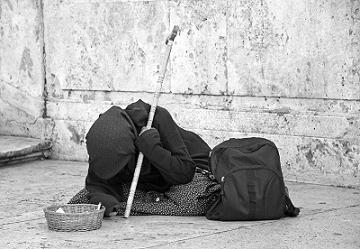“Only a virtuous people are capable of freedom. As nations become corrupt and vicious, they have more need of masters.” Benjamin Franklin
 Suppose I saw an elderly woman huddled on a heating grate in the dead of winter. She’s hungry and in need of shelter and medical attention.
Suppose I saw an elderly woman huddled on a heating grate in the dead of winter. She’s hungry and in need of shelter and medical attention.
In order to help her, I walk up to you and use intimidation and threats, demanding that you give me $200.00. Having taken your money, I purchase food, shelter and medical assistance for the woman.
Would I be guilty of a crime? A moral person would answer in the affirmative. I’ve committed theft by taking the property of one person to give to another. Most Americans would agree. But, would it still be theft if I were able to get three people to agree that that I had the right to take your money?
What if I got 100 people to agree — 100,000 or 200 million? What if instead of personally taking your money to assist the woman, I got together with other Americans and asked Congress to use Internal Revenue Service agents to take your money?
In other words, does an act that’s clearly immoral and illegal when done privately become moral when it is done legally and collectively? Put another way, does legality establish morality? Before you answer, keep in mind that slavery was legal; apartheid was legal; the Nazi’s Nuremberg Laws were legal; and the Stalinist and Maoist purges were legal. Legality alone cannot be the guide for moral people.
I personally believe that helping others in need by reaching into your own pocket is praiseworthy and laudable. But I also believe that helping those in need by reaching into another person’s pocket is despicable, dishonest and worthy of condemnation.
Some people call governmental handouts charity, but as James Madison acknowledged, “Charity is no part of the legislative duty of government.” And, to my knowledge, the Constitution has not been amended to include legalized theft as a legislative duty of Congress.
Our current economic crisis is a direct result of immoral conduct. Roughly two-thirds to three-fourths of our federal budget can be described as Congress’ taking the property of one American to give to another through corporate welfare, farm subsidies, subsidized housing, Medicaid, food stamps, welfare, ad nauseam.
Ayn Rand, in her novel “Atlas Shrugged” reminds us that “when you have made evil the means of survival, do not expect men to remain good.”
Source: Immoral Beyond Redemption by Walter E. Williams

